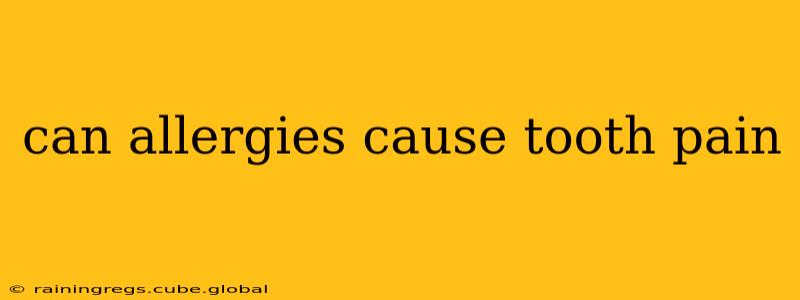While not a direct cause, allergies can indeed contribute to tooth pain, albeit indirectly. It's a complex relationship often overlooked, but understanding the mechanisms can provide much-needed relief. This article will explore the various ways allergies might trigger toothaches and what you can do about it.
How Allergies Might Lead to Tooth Pain
The link between allergies and tooth pain isn't always straightforward. It's rarely a case of allergies directly causing the pain in your teeth, but rather a series of events triggered by the allergic reaction. Let's break it down:
1. Sinus Infections and Pressure
Many allergies, particularly seasonal allergies (hay fever), can lead to sinus congestion and inflammation. The sinuses are located close to the upper teeth, and when swollen and filled with fluid, they can exert pressure on the nerves surrounding the teeth. This pressure can manifest as tooth pain, often mistaken for a dental problem. The pain might feel dull, achy, and concentrated in the upper molars and premolars.
2. Postnasal Drip and Acid Reflux
Allergic reactions often result in postnasal drip – the excess mucus draining down the back of the throat. This mucus, coupled with acid reflux (which allergies can sometimes worsen), can increase the acidity in the mouth. This acidic environment can erode tooth enamel, leading to sensitivity and pain, particularly when consuming hot, cold, or sweet foods and drinks.
3. Medication Side Effects
Some allergy medications, such as decongestants, can have a drying effect on the mouth. This dry mouth (xerostomia) reduces saliva production, which is crucial for neutralizing acids and protecting teeth. The lack of saliva can make teeth more susceptible to decay and increase sensitivity, potentially leading to pain.
4. Weakened Immune System
A prolonged allergic reaction can sometimes weaken the immune system, making you more vulnerable to infections. Gum disease (gingivitis or periodontitis), an infection of the gums, is a frequent source of tooth pain and can be exacerbated by a compromised immune system.
What to Do if You Suspect Allergy-Related Tooth Pain
If you're experiencing tooth pain alongside allergy symptoms like sneezing, runny nose, itchy eyes, or congestion, consider the following:
- Identify and Treat the Allergy: The first step is to manage your allergies effectively. This might involve over-the-counter or prescription allergy medications, avoiding known allergens, and using nasal sprays or saline rinses.
- Maintain Oral Hygiene: Good oral hygiene is crucial. Brush and floss regularly, and consider using a fluoride toothpaste to strengthen enamel.
- Hydration is Key: Drink plenty of water to combat dry mouth.
- See Your Doctor and Dentist: If the pain persists or worsens despite allergy treatment, consult both your doctor and dentist. Your doctor can assess the allergy, while your dentist can rule out any underlying dental issues. They can work collaboratively to determine the cause of your tooth pain.
Frequently Asked Questions (FAQs)
Can seasonal allergies cause tooth pain?
Yes, seasonal allergies can indirectly cause tooth pain primarily through sinus pressure and postnasal drip. The inflammation and excess mucus can put pressure on the nerves around the teeth, leading to discomfort.
Does an allergy to pollen cause tooth pain?
Pollen allergies, a common type of seasonal allergy, can indeed contribute to tooth pain through the same mechanisms as other allergies: sinus pressure and postnasal drip.
Can food allergies cause tooth pain?
While less common, food allergies can potentially cause tooth pain indirectly. For example, a severe allergic reaction might trigger swelling in the face and sinuses, leading to pressure on the teeth. Additionally, any underlying inflammation can increase sensitivity.
How long does tooth pain from allergies last?
The duration of tooth pain related to allergies varies. It typically lasts as long as the allergic reaction and its associated symptoms persist. Effective allergy management should reduce the pain.
By understanding the connection between allergies and tooth pain, you can better manage your symptoms and address the underlying causes, ultimately leading to a healthier mouth and a more comfortable life. Remember to consult with healthcare professionals for proper diagnosis and treatment.
